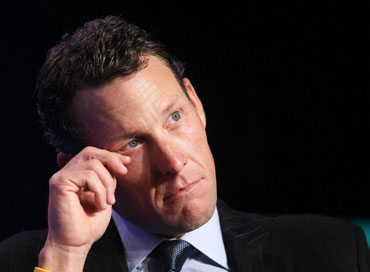Lance Armstrong's brand seems to be growing and expanding despite all the controversy surrounding the American cyclist, writes Desh Gaurav Chopra Sekhri
On August 23, 2012, Lance Armstrong decided to no longer contest the United States Anti-Doping Association's ("USADA") allegations of his repeated drug use.
He thus left himself open to being labelled a 'drug cheat' and having all seven of his Tour de France titles vacated, along with all other plaudits stripped from his once glittering resume. This development, while triggering global media attention, is not altogether a complete surprise.
What is surprising however is that societies and cultures across the world seem to be unaffected by this development and Lance's brand seems to be growing and expanding despite all that has taken place.
Performance enhancing drugs ("PEDs") are considered the worst form of deceit, and treated more harshly by the public than a personal failing. People are unforgiving of drug use, since this one aspect of an athletes' career that is completely within his control, or is at least deemed to be so.
 If the field of play, where the athletes' legend is born, is where the deceit and cheating takes place, then the battle for redemption is almost always a lost cause. History has been a lot kinder to individuals who have faced personal failings unrelated to the field of play, and although they have tended to incur the ire of society and cultures, success on the playing grounds has helped transcend much of the societal distaste that their actions may have inspired.
If the field of play, where the athletes' legend is born, is where the deceit and cheating takes place, then the battle for redemption is almost always a lost cause. History has been a lot kinder to individuals who have faced personal failings unrelated to the field of play, and although they have tended to incur the ire of society and cultures, success on the playing grounds has helped transcend much of the societal distaste that their actions may have inspired.
Numerous examples come to mind Tiger Woods and the infidelity claims, Kobe Bryant and the rape allegation, Michael Phelps and the party photographs, Floyd Mayweather and his felonious conduct, and Michael Vick and his dog-fighting establishment. All of them have seen their brand decline, but success and remorse has led them back towards their trysts with greatness and legend.
Drug offenders find the path far less easy to tread, and those who have seen a fall from grace due to their on-field failings find the going even tougher when society refuses to accept their accomplishments as legitimate. A question-mark pertaining to performance enhancing drug use is a death knell for any athletes' popularity or brand worth.
There are very few if any, stars who can transcend society's cold shoulder once they have been found guilty of achieving through ill-gotten ways. Baseball players Barry Bonds, Mark McGwire and Sammy Sosa; runners Ben Johnson, Marion Jones, and Justin Gatlin; and, of course, cyclists like Floyd Landis and Alberto Contador can attest to that.
There is a cultural stigma that attaches itself to PED use. For any other individual, especially one who outperformed the best of the rest in a sport known for widespread drug use that is ahead of any testing measures, the brand and societal acceptance would be in a downward spiral.
But, Lance Armstrong seems unique despite his results having been declared null and void since 1998, his lifetime ban from racing essentially negating all that he has done on two wheels, and all the lore that accompanies his fight to the top now attributed to drug use and a concentrated drug trafficking scenario within his racing team, his brand looks poised to increase and grow.
This is remarkable, because Armstrong's claim towards struggle, success and survival was dependant to a great extent on his ability to overcome seemingly insurmountable adversity and achieving results that were nothing short of superhuman. Now that he no longer has the on-road brand value, one would expect his star to have drastically waned.
But instead his brand has grown and expanded even in the last couple of weeks and the reason for this is that it wasn't merely his struggle and success that made him who he was, it was the very fact that he overcame terminal cancer and chemotherapy to emerge as a champion for all who felt that cancer or illness meant the end of the road.
To be honest, there have been numerous commentaries over the last decade that prepared the fans for exactly this eventuality that he was a transcendent star who had devoted his life to the fight against cancer through his "Livestrong" campaign, his books, and his fundraising that has raised more than $500 million.
It's not that what Lance allegedly did on the track and how he did it was fine with the fans. It's just that what Lance has come to stand for in the mind of societies and cultures across the world that matters. He overcame the odds and became the spokesperson against mortality.
And this is why he is a transcendent star with or without the yellow jerseys or the records. He might just be the only one that our generation will accept and celebrate despite the manner in which it allegedly was achieved.
The author is a sports attorney at J Sagar Associates. These views are personal






